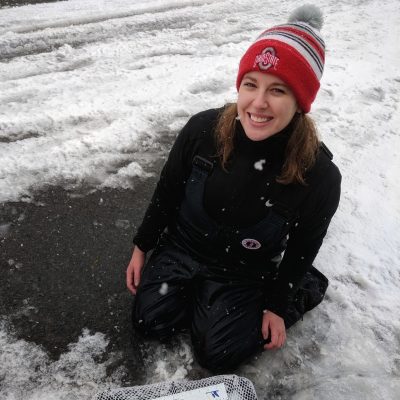Student Spotlight: Taylor Brown

November 5, 2019
Taylor Brown is a M.S./Ph.D. student in natural resources from Napoleon, Ohio. After earning her undergraduate degrees at Northwest State Community College and The Ohio State University, she chose to attend Cornell for the ability to work on projects that closely align with her research interests.
What is your area of research and why is it important?
For my graduate research, I am studying the ecology of two fish species native to the Laurentian Great Lakes, Cisco (Coregonus artedi) and Lake Whitefish (Coregonus clupeaformis). My research is focused on gaining an increased understanding of the contemporary spatial extent and relative abundance of Cisco and Lake Whitefish spawning populations across Lake Ontario. Further, I am working to determine the ecological mechanisms that drive population success for each species, such as food web interactions, climatic conditions, and suitable habitat availability.
What are the larger implications of this research?
Cisco and Lake Whitefish were historically major components of fish communities in the Great Lakes and supported widespread commercial fisheries. However, because of overfishing, invasive species, and habitat degradation, populations collapsed throughout the Great Lakes during the 20th century. Today, scientists and managers are working to restore these species, but relatively little is known about contemporary Cisco and Lake Whitefish ecology. My research is directly contributing to an improved understanding of Cisco and Lake Whitefish population dynamics, how these populations may respond to future ecological pressures or management actions, and potential limitations to restoration success.
What inspired you to choose this field of study?
I am fascinated by the intrinsic interconnectedness of ecosystems. For example, simply removing or adding a single species can cause dramatic shifts in ecosystem structure and function. By understanding the complex interactions within ecosystems, scientists and managers can better predict how populations will respond if these connections are altered. This is especially important in fisheries, where humans continually interact with and directly modify ecosystems. By studying fisheries ecology and management, I have the opportunity to answer questions that are both ecologically interesting and critical for effective fisheries management decision-making.
What led you to found the First Generation and Low Income (FiGLI) Graduate Student Organization?
When I arrived at Cornell, I was excited to find that there was a First Generation Student Union, but quickly realized that the focus was on undergraduate experiences. As a former first-generation undergraduate, I was happy to see that support existed for undergraduates…but as a new graduate student, I recognized that entirely new challenges awaited me. When Rachel King, another first-generation/low-income graduate student, began seeking co-founders for FiGLI, I knew immediately that I wanted to help found an organization focused on the unique challenges that first-generation and low-income graduate students face.
How will this group address issues specific to first generation and low income graduate students?
First-generation and low-income students often lack knowledge of the cultural capital and hidden curriculum of academia, ultimately leading to exclusionary environments and depressed career mobility. On a more personal level, disadvantaged students from working class backgrounds are continually reminded of the deep inequalities that surround them at wealthy universities like Cornell. FiGLI’s goals are to empower first-generation and low-income students in overcoming these challenges and thriving in graduate school. Specifically, FiGLI plans to address these issues by fostering a supportive social community, connecting students with resources for navigating academia, providing professional and personal development opportunities, and promoting allyship across campus.
What are your hobbies or interests outside of your research or scholarship?
Beyond my research focus, I am personally interested in sociology, history, political science, and issues of socioeconomic injustice. In my free time, I enjoy cooking, trying new restaurants and cuisines, running, and gathering with friends over dinner or drinks.
Why did you choose Cornell to pursue your degree?
I chose Cornell because of the opportunity to work on projects that closely align with my research interests and to join a highly collaborative community of scientists tackling similar problems. At Cornell, I’m a member of both the NY Cooperative Fish and Wildlife Research Unit and the Cornell Biological Field Station at Shackelton Point. Beyond Cornell, my research involves a large group of federal, state, and provincial biologists across several government agencies. By joining this cooperative Great Lakes fisheries research community, I have the ability to tackle large-scale research questions and achieve goals that I couldn’t possibly realize alone.
